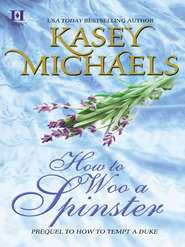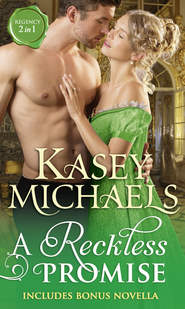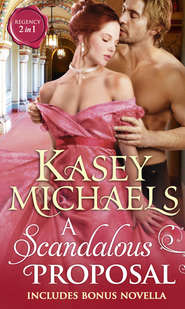По всем вопросам обращайтесь на: info@litportal.ru
(©) 2003-2025.
✖
Romney Marsh Trilogy: A Gentleman by Any Other Name / The Dangerous Debutante / Beware of Virtuous Women
Автор
Год написания книги
2018
Настройки чтения
Размер шрифта
Высота строк
Поля
CHAPTER ELEVEN
JULIA STOOD IN FRONT of the long mirror in her bedchamber, surprised to find that she looked the same this morning as she had last night. She should have been able to see some difference, for she most certainly felt different.
She raised her hands to her breasts, covered once more in her simple cotton shift, and for the first time in her life thought of her body as anything more than that—her body.
That Chance could show such delight in that body, that he could bring such delight to that body?
“We’re all God’s creatures, Julia,” her father had told her the day she’d come running to him, sobbing, telling him that she was bleeding, she was going to die. “Today, my sweet girl, you have taken one more step in His plan for His creations. Today, Julia, you are a woman.”
Julia smiled, that smile a mixture of sadness and wry amusement. “No, Papa, not then,” she said quietly, acutely missing the man who had been both father and teacher. “Last night I became a woman. But if God has a plan, Papa, it’s still His secret.”
She crossed over to the bed and picked up the length of black grosgrain ribbon that had last been tied around Chance’s hair. She’d held it tight in her hand all night, like some silly, simpering fool.
She should give it back to him. She really should.
Instead she walked back to the mirror and watched her reflection as she tied the ribbon around the left strap of her shift, then tucked it inside, next to the skin of her breast, over her heart.
“There,” she told herself, lifting her chin. “You are now most definitely a pitiful, pathetic penny press heroine with more hair than wit.”
Julia quickly finished dressing, having declined the assistance of the maid who had come scratching at her door earlier with hot chocolate and toasted bread and butter. She’d needed to be alone.
But now she needed to be with people so that she had something else to occupy her mind other than what she would say when she next saw Chance Becket.
She found Alice in the nursery, Callie with her, the two of them happily investigating cupboards for toys that had been tucked away when the older girl had left the nursery, while Edyth watched them, a smile on her homely face.
The drapes had all been pulled back from the windows, and the morning sun streamed into the large room, making blocks of sunlight on the large Aubusson carpet that could have graced the finest London drawing room if it weren’t here, in the back of beyond.
The sunlight reminded Julia that she had wanted to walk out this morning, see the house and sea, smell the air.
“Good morning, ladies,” she said, and the two girls turned to grin at her. “Who would like to accompany me on a walk down to the water?”
Ten minutes later, after being assured that both children had eaten and with all three of them wearing pattens Edyth had told them they could find in the hallway behind the kitchens, they were off.
Holding tight to Alice’s hand, Julia followed Callie, who ran ahead, waving her arms as she danced her way toward the water. “Oh, go with her,” she told Alice, who was tugging on her hand now. “Just be careful.”
Julia watched the children as they ran up and down the waterline, pretending they were gulls, swooping with their arms, daring the water to lap at their feet.
That’s when she looked to her left and noticed in the distance, around a curve in the waterline, the marvelous sloop anchored not fifty yards from the shore, its sails secured as it rode high in the water. She was much too far away to see it clearly, but it looked to be perhaps sixty feet in length and well kept. There were also a few smaller boats pulled up on the shore and turned upside down, cork-strung fishing nets spread over their hulls to dry in the sun.
The presence of the boats didn’t surprise her. Becket Hall was, after all, sitting right next door to the Channel.
The French ship was still out there, too, small in the distance, still sailing parallel to the shore. She watched it for a while, then turned about to look back at Becket Hall.
She couldn’t decide if the house looked as if it had been dropped there from the sky or if it had grown up from the land. There was something of the fortress about it, even with the sun winking off the multitude of windows and with its large terrace and gracefully curving staircases at either end of the terrace winding up from the ground.
From her vantage point and in the same direction as where the sloop was anchored, she could see what had to be the large stables, as well as a multitude of outbuildings of all shapes and sizes, all of them at a good distance from the Hall.
Keeping one eye on Alice and Cassandra, Julia walked along the shoreline, seeing where the shoreline, in the distance, rather than being flat, rose into low chalk cliffs, with the waves crashing up against them. She wondered if there were caves there and if the smugglers used them to hide their hauls before moving them inland.
Then she decided she shouldn’t think about such things.
“Look, Julia, look!” Alice called out as she held out her arms and ran. “I’m a gull, I’m a gull!”
Julia laughed and waved, then, feeling secure in Cassandra’s presence, turned inland herself, heading for the large stable yard and the buildings that had been fashioned to blend in with the architecture of the stone house. She skirted the three-railed fence, carefully picking her way, then looked up and gasped. A village?
No. Not a village. A street, only one, but with houses on both sides and a few small shops. And all of it not a quarter mile from Becket Hall.
She hadn’t seen any of this the night they’d arrived; it had been much too dark. She’d had no idea….
“We’re fairly self-sufficient here on the estate, Miss Carruthers.”
Julia gasped, then turned to see Ainsley Becket standing not ten feet from her. “Mr. Becket, good morning,” she said, dropping into a quick curtsy. “I…I, um—”
“I saw the girls, yes. They’re amusing themselves. I’m so pleased Cassandra has company now. As well as Alice. Would you care to walk with me?”
“I’d like that, yes,” Julia said, and when he inclined his head toward the low rise leading up to the small houses, she fell into step beside him.
Ainsley Becket was tall and lean and very fit for a man she believed to be on the sunny side of fifty. He had silver threaded through his black hair that he wore shorter than his adopted sons, with only a stray lock or two blowing across his forehead in the breeze coming from the Channel.
“Chance would have told you that we came here some years ago,” he said as they walked along. “My family, myself and most of the crew from the two ships that brought us here. Their wives and families, as well. You’ll see bits of those ships everywhere, in the walls of the houses. We left the sea, you understand, and made certain we wouldn’t be tempted to go back again.”
“But you have the sloop?”
“Yes. It amuses Jacko. He occasionally runs it out toward any French vessel that sails too close, only to watch the Frogs hop away.”
Julia laughed, for the first time finding something that, if not serving to make Jacko endearing, at least made him seem human. “Chance was a sailor, as well?”
“I owned two ships, Miss Carruthers. There is a vast difference between owning ships and being a sailor. I made my fortune carrying other people’s goods from place to place. Mostly I would say I was a bookkeeper.”
“A trader,” Julia said, keeping her gaze on the uneven ground as they walked and not believing a word the man said. Ainsley Becket had the look of a man who’d spent a lot of years standing on a deck, squinting into the sun.
When she looked up again, it was to see a huge wooden carving that stood at least twenty feet high. “Oh, my goodness!”
Ainsley laced his fingers together behind his back, this strikingly handsome man, dressed all in black and with bluest-blue eyes older than time. “The bowsprit and figurehead of my best ship, Miss Carruthers,” he said, gesturing toward the marvelous carving. “The boys refused to part with her.”
“She’s a mermaid, isn’t she?” Julia asked, still amazed. It was as if someone had sliced off a portion of the very front of a ship, then planted it in the ground, braced it with thick beams. The large painted figure had a lower body of silvery-blue scales and a graceful, sweeping fish tail, and her bare breasts were partially covered by her long golden-yellow hair. She seemed to be looking off into the distance, always the first to see something new as the ship cut through the water.
“Pike carved her. One of my men,” Ainsley said, placing a hand on the polished wood the mermaid was attached to, stroking that wood almost gently. “Now she looks from the land to the sea. I wonder if she’s ever lonely for it.”
“Are you, Mr. Becket?” Julia asked before she could guard her tongue. “Oh, I’m sorry. I shouldn’t have asked that.”
He offered his arm and then turned away from the figurehead, from the double row of small cottages behind it. “I made my fortune in the islands, Miss Carruthers. But it was time to come back to England. The girls, you understand. The boys were one thing, but not the girls.”
Julia nodded. “Yes, I understand. You’ve built a world for them here, haven’t you?”
“Yes…excuse me,” Ainsley said, removing the support of his arm as he turned and walked, his strides long and purposeful, toward the large fenced-in area where several horses grazed.
Julia looked toward the shoreline to see Cassandra and Alice were busy picking up mussel shells and arranging them on the wet sand, and then lifted her skirts and quickly followed after him.











